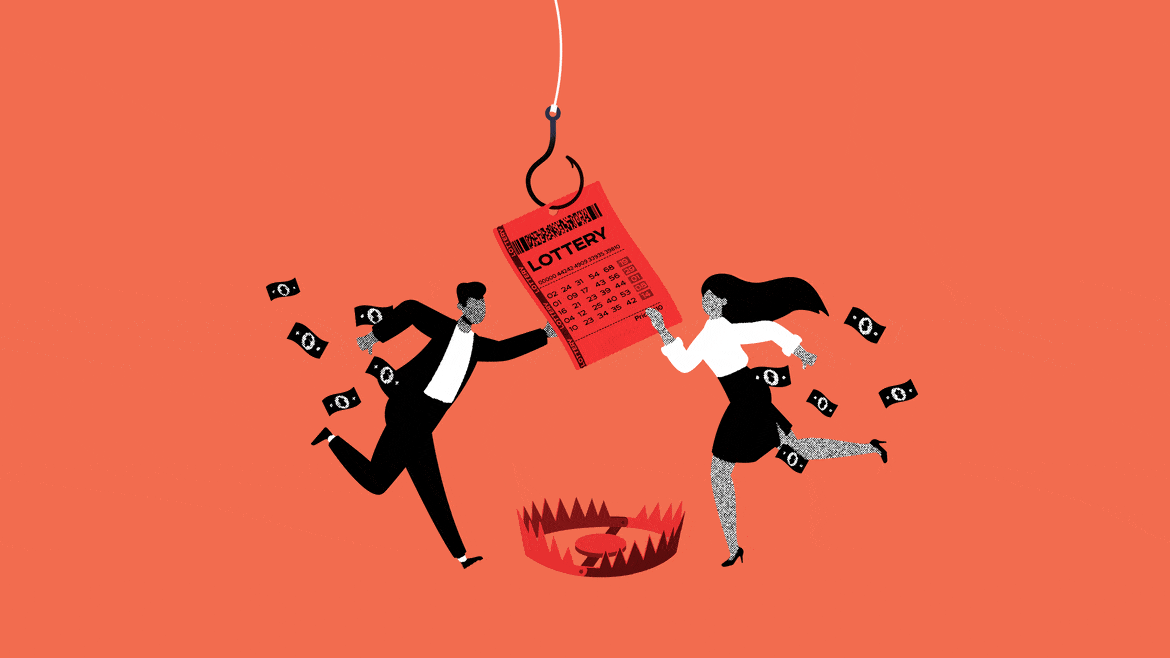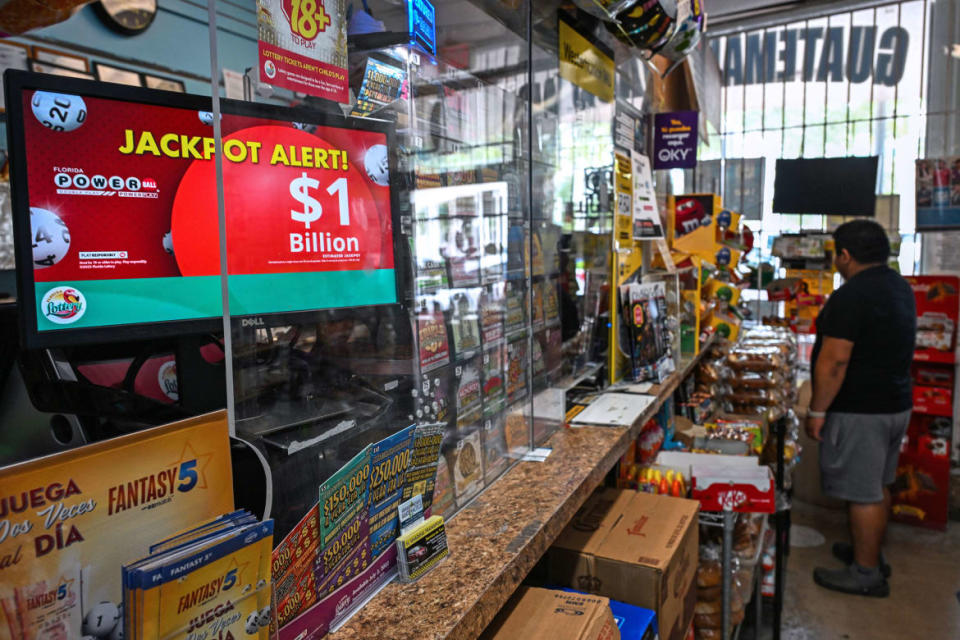Lotteries Are a Sucker’s Bet and a Gift to the Ultra-Rich

If there’s anything the world desperately needs right now, it’s another billionaire—and with any luck (see what I did there?) America’s already immense wealth gap will grow just the teensiest bit wider after Friday’s Mega Millions lottery drawing!
For the fifth time in its history, the Mega Millions jackpot has ballooned to more than $1 billion. The good news for the grand prize winner is that the myth of a “lottery curse” turns out to be nothing more than exactly that—a myth. The bad news is the winner will definitely not be you. Or society.
Let’s start with the good stuff. Most of us have heard tragic horror stories about people whose lives took a nosedive once they struck it rich. There’s the one about Jack Whittaker, who after winning $315 million in 2002, lost a daughter and granddaughter to drug overdoses; or Craigary Burch Jr., who was murdered in 2016 after his $400,000 lottery win.
‘Anti-Woke’ GOP Candidate Vivek Ramaswamy Can Thank Affirmative Action for His Success
Also plentiful are tales of winners who recklessly squandered their new fortunes, ending up broker than when they started. There’s an oft-referenced claim, circulated for years by various esteemed media outlets, that 70 percent of lottery winners go bankrupt roughly five to seven years after winning. It’s a number that someone made up, like that thing about how we all eat eight spiders while we sleep. (The National Endowment for Financial Education, clearly sick of being erroneously cited as the source of the bankruptcy stat, took the extraordinary step of releasing a 2018 statement disavowing all affiliation with the figure.)
In fact, a study dating back to the 1970s in the U.S.—and in more recent years, as Slate reports, from Germany, the U.K., Singapore, and Sweden—confirms that lottery winners are actually happier after their windfalls.
A 2004 survey of lottery winners in Ohio, and another 2011 paper focused on winners in Florida, found that most lottery winners don’t end up broke and, in fact, most don’t even quit their jobs, though they do tend to take longer vacations.
But none of that really matters as far as you’re concerned, because you won’t be winning tonight’s lottery drawing—or any other, most likely.

Jack Whittaker, center, lost a daughter and granddaughter to drug overdoses after winning $315 million in 2002.
The odds were always stacked against you, but the officials behind both Mega Millions and Powerball lotteries have made regulatory and other changes to make the odds even longer. The chances of winning Powerball—which stood at $95 million as of Wednesday night’s drawing—was one in 175 million eight years ago, but is one in 292.2 million today. Back in 2017, your odds of winning Mega Millions were one in 259 million. Today, they’re estimated to be about one in 302.5 million.
That means you have a better chance of being eaten by a shark, attacked by a grizzly bear, getting struck by lightning, or becoming president of the United States than of taking home tonight’s big prize.
With so little chance of winning from the outset, throwing more money at the problem by buying more tickets won’t do anything to help you even the score.
In 2022, the CEO of Raising Cane’s, a fast food chain, spent $100,000 buying 50,000 Mega Millions tickets, hoping to net one of his employees the nearly $800 million pot. When the batch of tickets failed to turn up a winner, he spent another $100,000 on another 50,000 tickets, only to see the $1.28 billion pot go to someone else. The moral of the story? Just pay people more.
It’s not just the massive national headline-making lotteries that shortchange ticket buyers, either.
This Juneteenth, Remember the GOP Is the Neo-Confederate Party
Lotteries exist in nearly every state, and roughly 50 percent of Americans splurge on a ticket once a year, while one in four buys a ticket once a month. In fact, as historian Jonathan D. Cohen notes in his 2022 book For a Dollar and a Dream: State Lotteries in Modern America, not only do “Americans spend more on lottery tickets every year than on cigarettes, coffee, or smartphones,” they also shell out more on lotteries “annually than on video streaming services, concert tickets, books, and movie tickets combined."
But in a country where economic mobility is increasingly the same unattainable fever dream for just about everyone, and where Black wealth accumulation and intergenerational wealth transmission have been impeded since its founding, Black and poor folks often see lotteries as a sort of colorblind means of making up the difference.

Powerball lottery tickets pictured inside a store in Homestead, Florida.
Last year, a study from the Howard Center for Investigative Journalism found that “in every state where lotteries are legal, stores that sell tickets are disproportionately clustered in lower-income communities,” most of which are home to mostly Black and/or Hispanic residents. (The five states that ban lotteries are Alabama, Alaska, Hawaii, Utah, and Nevada.)
“In an economy that still does not treat all people equally,” Cohen wrote in a Washington Post editorial, “it is no wonder that so many Black Americans see lottery tickets as a chance they are willing to take.”
Consequently, the study’s authors note, state lotteries have helped drive a “multibillion-dollar wealth transfer that relies on spending by less-educated and less-wealthy Black and Hispanic Americans.” In households where the highest earners live, the average annual spending on lottery tickets is about $105, a figure which rises to $412 in the poorest homes, according to Bloomberg.
What’s more, lotteries offer the worst return on investment, generally paying out some 50 to 60 percent of what a ticket buyer spends. The Tax Foundation notes that the figure pales in comparison to casino payouts of “about 90 percent for slot machines or table games.”
Because lobbyists have been relentless in promoting the idea, people often assume those losses to the poorest and vulnerable are somehow made up by the fact that social services ultimately benefit.
Yeah, no.
Before states get their money, the many entities behind their lotteries—the behemoth private multinationals and their billionaire CEOs, the tiny corner stores and big chains which sell the tickets, the pricey marketing companies that crank out the ads that keep people hoping—all get their cut.
RFK Jr.’s Legacy of Inflicting Severe Damage on Black Communities
The rest may make their way to social programs, but generally add far less, percentage-wise, than most people assume. An October 2022 report from the New Yorker notes that last year, “according to the California Department of Education, lottery income accounts for roughly 1 percent of all K-12 funding,” while also pointing to a report from the National Conference of State Legislatures indicating “lotteries bring in, on average, about 1 percent of state revenue per year.”
And because legislators often rightly see raising taxes as a potentially election-losing move, they deal with insufficient education budgets not by adding lottery revenues to the money already allocated—but by using those revenues to offset money that gets moved elsewhere, in an endless shell game.
And there you have it. The lottery not only serves to further impoverish the poor, but it also quite literally gives to the rich (specifically, the CEOs who already have more money than they can spend). And yet, the billions will just keep coming, a mirage of possible financial security in what can feel like an economic desert.
But more than a billion dollars is sitting there for the taking at this Friday night’s Mega Millions—funded almost entirely by working-class dreamers for the benefit of the rich. Good luck.
Get the Daily Beast's biggest scoops and scandals delivered right to your inbox. Sign up now.
Stay informed and gain unlimited access to the Daily Beast's unmatched reporting. Subscribe now.

